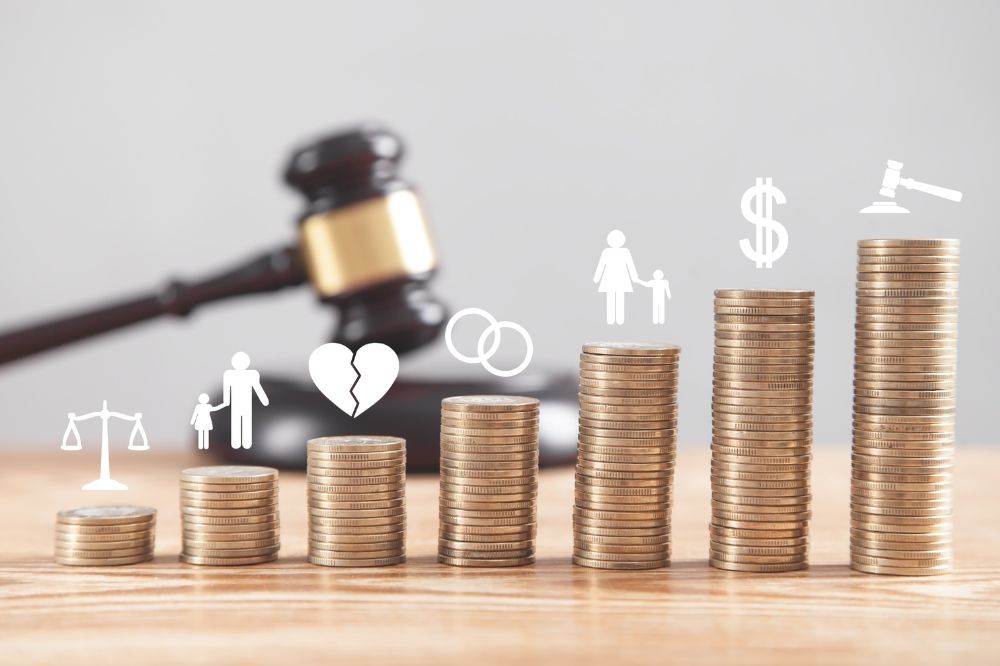Navigating the intersection of bankruptcy, divorce proceedings, family court, property division process, child support, and spouses can be a challenging journey. When financial struggles intertwine with marital dissolution involving spouses, complexities arise that demand careful consideration in family court. Understanding how these two significant life events interact is crucial for individuals facing such circumstances. While bankruptcy offers a fresh start by discharging debts, divorce can bring about asset division, financial obligations, and claims between spouses. Balancing these aspects requires strategic planning and legal expertise to ensure the best possible outcomes for all parties involved.
Key Takeaways
- Consider the Timing: Timing bankruptcy and divorce proceedings strategically can have significant financial implications for spouses and parties. Seek professional advice, such as a bankruptcy lawyer, to understand the best approach for your situation regarding tax, spouses, and community.
- Prioritize Communication: Open and honest communication with your spouse, parties, about financial matters, debtor during divorce and bankruptcy is crucial to navigate the process smoothly.
- Seek Legal Guidance: Consult with both a bankruptcy attorney and a family law attorney to ensure you, as a debtor, understand the legal implications of bankruptcy on your divorce, asset division, tax, and community.
- Plan for Post-Divorce Debt Management: Develop a clear plan for managing debts post-divorce, taking into account any obligations arising from the bankruptcy process.
- Understand Asset Division: Familiarize yourself with how assets are divided in bankruptcy and divorce to protect your interests and assets effectively.
- Stay Informed: Stay informed about the impacts of Chapter 13 bankruptcy on divorce proceedings to make informed decisions regarding your financial future.
Understanding Bankruptcy
Basics
Bankruptcy refers to a legal process that helps debtors, individuals, or businesses eliminate debt under the protection of the court. Divorce proceedings, on the other hand, involve the legal dissolution of a marriage. The key difference lies in their focus: bankruptcy addresses financial issues, while divorce deals with marital status.
In bankruptcy, debts are typically discharged, providing a fresh start for individuals overwhelmed by financial obligations. In contrast, divorce results in the termination of a marriage and addresses issues such as alimony, child support, and asset division. Legal implications vary significantly between the two processes, impacting financial stability and personal relationships differently.
Types
Bankruptcy, involving the debtor, includes Chapter 7 (liquidation), Chapter 13 (repayment plan), and Chapter 11 (reorganization). Each type has distinct implications for assets, debtor, and debt repayment during divorce proceedings. Divorce types range from uncontested to contested, affecting the distribution of assets and liabilities during bankruptcy.
For instance, Chapter 7 bankruptcy may liquidate joint assets in divorce cases to repay creditors and debtor. In contrast, Chapter 13 allows debtors to retain assets while following a court-approved repayment plan. Understanding these nuances is crucial for navigating the intersection of bankruptcy and divorce effectively.
Process
Bankruptcy proceedings, involving the debtor, include filing a petition with detailed financial information followed by creditor meetings and court approval. Divorce processes entail filing a petition or complaint for divorce, negotiation or litigation of terms like property division and spousal support, leading to a final judgment dissolving the marriage.
Timelines vary based on jurisdiction but generally take several months to years to complete. Legal requirements include disclosing all assets and debts accurately in both bankruptcy and divorce cases. Documentation such as income statements, tax returns, asset valuations, and expense records play a vital role in substantiating claims throughout these processes.
Divorce and Finances
Asset Division
Asset division, involving debtor, plays a crucial role in both bankruptcy and divorce proceedings. During divorce, assets are typically divided based on factors such as the length of the marriage, each party’s financial contributions, and the needs of any children involved. On the other hand, bankruptcy involves a court-appointed trustee overseeing the liquidation of assets to repay creditors.
Understanding how assets are divided is essential to navigate through these challenging times. Factors influencing asset division include prenuptial agreements, individual ownership of assets, and state laws governing marital property. The implications of asset division can significantly impact your financial future by determining your post-divorce or post-bankruptcy financial stability.

Debt Responsibility
Debt responsibility is a critical aspect of both bankruptcy and divorce processes. In bankruptcy, debts are typically categorized as secured or unsecured, with secured debts being tied to specific assets like homes or cars. Conversely, in divorce situations, debt responsibility can vary based on factors such as who incurred the debt and whether it was for joint expenses.
Understanding debt responsibility is key to effectively managing your financial obligations. Strategies to handle debt responsibility include negotiating with creditors for lower payments, consolidating debts for easier management, and seeking legal advice to navigate complex debt issues during divorce or bankruptcy proceedings.
Bankruptcy Impacts
Credit Score
Bankruptcy and divorce can significantly affect your credit score, leading to a decrease in your overall creditworthiness. Bankruptcy usually has a more severe impact on credit scores compared to divorce.
Understanding the distinct effects of bankruptcy and divorce on credit scores is crucial for financial planning. After experiencing bankruptcy or divorce, it’s essential to take proactive steps to rebuild your credit score.
Asset Protection
During bankruptcy and divorce proceedings, protecting your assets is vital to safeguarding your financial stability. Various strategies can be employed to protect assets, such as setting up trusts or transferring assets legally.
Asset protection plays a crucial role in both bankruptcy and divorce cases. Seeking legal advice from a knowledgeable bankruptcy lawyer can help you navigate the complexities of asset protection during these challenging times.

Divorce Law Issues
Property Division
Property division in bankruptcy and divorce cases involves categorizing and distributing assets. Understanding the nuances is crucial for a fair outcome. In divorce proceedings, assets are categorized as marital or separate property, impacting distribution. Familiarize yourself with your rights and obligations regarding property division to navigate the process effectively.
- Marital property includes assets acquired during the marriage
- Separate property encompasses assets owned before marriage or obtained through inheritance
Debt Allocation
Debt allocation in bankruptcy and divorce proceedings determines how liabilities are divided. In bankruptcy, debts are classified based on priority levels, influencing the repayment order. Understanding the criteria used to allocate debts in each situation is essential for making informed decisions.
- Criteria such as who incurred the debt and its purpose play a role
- Debt allocation can significantly impact your financial standing post-bankruptcy or divorce
Chapter 13 Bankruptcy
Filing Process
To begin filing for Chapter 13 bankruptcy, individuals must understand the intricate legal and paperwork requirements. Familiarize yourself with the process to ensure a smooth initiation. The key steps involved in filing are crucial for a successful bankruptcy case.
Understanding the paperwork for bankruptcy and divorce is essential as it involves detailed financial information. Legal requirements play a significant role in ensuring the accuracy of the filings. Knowing these requirements will help streamline the filing process effectively.
Initiating the filing process for Chapter 13 bankruptcy requires careful consideration and planning. Understanding the key steps involved will guide individuals through each stage efficiently. By following these steps meticulously, one can navigate the complexities of bankruptcy proceedings.
Payment Plan
In bankruptcy cases, various payment plans are available to debtors based on their financial situation. Exploring these options is crucial for selecting the most suitable plan. Understanding how payment plans work is essential for managing debts effectively.
Payment plans in divorce cases are structured differently from those in bankruptcies. It’s important to comprehend these variations to make informed decisions. Negotiating payment plans that align with your financial capabilities is vital for avoiding further financial strain.
Learning about negotiating payment plans is beneficial in both bankruptcy and divorce proceedings. Tailoring a plan that suits your financial situation can alleviate stress during challenging times. Effective management of payment plans ensures a smoother financial recovery process.
Divorce During Bankruptcy
Legal Considerations
Legal professionals play a crucial role in guiding individuals through the complex processes of bankruptcy and divorce. They help navigate the intricate legal landscape, ensuring that all procedures are followed correctly. It’s essential to have legal representation to protect your rights and ensure fair treatment.
Understanding your rights and responsibilities from a legal standpoint is vital during bankruptcy and divorce proceedings. Legal considerations can vary depending on the type of bankruptcy filed, such as Chapter 13. Knowing how the law applies to your situation can significantly impact the outcomes of both processes.
- Legal professionals guide you through complex procedures
- Protect your rights and ensure fair treatment
- Understanding legal rights is crucial for favorable outcomes
Financial Implications
Bankruptcy and divorce carry significant financial implications that can affect your stability. Each process can impact your financial situation differently, requiring careful consideration and planning. It’s important to be aware of how these decisions can influence your financial future.
Recognizing the financial consequences of both bankruptcy and divorce is essential for making informed decisions. While bankruptcy may offer relief from overwhelming debt, it can also have long-term effects on credit scores and financial opportunities. Similarly, divorce can lead to asset division and support payments that impact financial well-being.
- Financial implications affect stability
- Decisions impact future financial well-being
- Awareness of consequences aids decision-making
Strategies to mitigate negative financial consequences include careful planning and seeking professional advice. Creating a detailed budget, exploring debt repayment options, and understanding the implications of asset division are crucial steps in managing finances during these challenging times.
Asset Division in Bankruptcy
Equitable Distribution
Equitable distribution ensures fair asset and debt allocation during bankruptcy and divorce proceedings. The process aims to divide assets and debts equitably based on various factors. Understanding equitable distribution is crucial for a smooth resolution.
In both bankruptcy and divorce, assets and debts are distributed fairly to ensure equity among parties involved. The principles of equitable distribution focus on achieving a balanced outcome for all parties. Knowing these principles can help you navigate through the asset division process effectively.
The application of equitable distribution principles varies depending on the specifics of each case. Factors such as the duration of the marriage, financial contributions, and individual needs are considered when determining asset allocation. Being aware of these factors can help you prepare for the asset division process.
Community Property
Community property plays a significant role in both bankruptcy and divorce scenarios, influencing how assets are divided and debts are allocated. Understanding community property laws is essential to comprehend your rights and responsibilities during these processes.
In bankruptcy cases, community property laws dictate how shared assets and debts should be handled. It’s crucial to be aware of these laws to ensure proper asset division and debt allocation according to legal requirements. Familiarizing yourself with community property concepts can help you protect your interests effectively.
Knowing your rights regarding community property empowers you to make informed decisions during bankruptcy or divorce proceedings. Understanding how community property laws impact asset division provides clarity on what assets are subject to distribution and how debts are assigned. This knowledge is vital for safeguarding your financial well-being.
Managing Debts Post-Divorce
Joint Debts
Joint debts in bankruptcy and divorce cases are often challenging to navigate. Both parties are responsible for these debts, regardless of the divorce agreement. Understanding the implications of joint debts is crucial.
When handling joint debts, it’s important to know that both parties are liable for repayment. This means that even if one party agrees to take on the debt in the divorce settlement, creditors can still pursue the other party if payments are not made.
To manage joint debts effectively post-divorce, consider options such as debt consolidation or negotiation with creditors. Seeking legal advice can also help in understanding your rights and obligations regarding joint debts.
Individual Debts
Individual debts in bankruptcy and divorce proceedings are typically treated differently from joint debts. Each party is usually responsible for their individual debts, unless stated otherwise in a prenuptial agreement or court order.
In bankruptcy, individual debts are usually discharged based on the type of bankruptcy filed. However, in divorce proceedings, individual debts may still be subject to division depending on state laws and the specific circumstances of the case.
Understanding the impact of individual debts on your financial future is essential. Failure to address individual debts post-divorce can lead to financial instability, credit issues, and potential legal consequences.
Strategic Timing
Filing First
Initiating bankruptcy or divorce proceedings first comes with its set of advantages and disadvantages. By planning the timing strategically, individuals can significantly impact the outcomes of their cases. Filing for either bankruptcy or divorce initially can set the tone for the entire process.
Filing for bankruptcy before divorce can help in clearing joint debts, providing a fresh financial start. However, this may lead to complications in property division during divorce proceedings. On the other hand, filing for divorce first allows individuals to focus on dividing assets without the interference of bankruptcy procedures.
Understanding the strategic implications of filing first is crucial. For instance, if one spouse files for bankruptcy before divorce, it may protect their separate assets from being included in the bankruptcy estate. Conversely, filing for divorce first might safeguard individual assets from being divided as marital property.
Divorce First
When considering whether to initiate divorce proceedings before bankruptcy, various factors come into play. The decision heavily depends on each individual’s unique financial situation and goals. Getting divorced first may provide a sense of closure and emotional relief before tackling financial matters through bankruptcy.
One significant benefit of getting divorced before filing for bankruptcy is that it simplifies asset division. By finalizing the divorce prior to bankruptcy, couples can avoid potential conflicts over property distribution during bankruptcy proceedings. However, divorcing first might result in losing certain protections offered by bankruptcy laws.
Filing for divorce before bankruptcy can impact an individual’s financial situation significantly. It can affect how debts are divided between spouses and which liabilities each party will be responsible for post-divorce. Timing plays a vital role in determining how assets and debts are treated during both processes.

Final Remarks
In the complex intersection of bankruptcy and divorce proceedings, understanding the nuances of each can help you navigate these challenging times. From the impact on your assets to the strategic timing of decisions, being informed is your best tool. Remember, Chapter 13 bankruptcy offers a unique route during divorce, and managing debts post-divorce requires careful planning. By grasping these key points, you empower yourself to make sound financial choices.
As you move forward, seek professional advice tailored to your situation. Your financial well-being is paramount, and expert guidance can provide clarity amidst uncertainty. Take proactive steps to secure your future and emerge stronger from this challenging period.
Frequently Asked Questions
Is filing for bankruptcy during divorce proceedings a common occurrence?
Filing for bankruptcy during divorce is not uncommon, as financial issues often arise. It can help manage debts and provide a fresh start post-divorce.
How does Chapter 13 bankruptcy affect divorce proceedings?
Chapter 13 bankruptcy allows debt reorganization, which can impact asset division in divorce. It may provide a structured way to handle debts and protect assets during divorce.
What are the implications of asset division in bankruptcy during divorce?
Asset division in bankruptcy during divorce involves determining how assets will be distributed based on bankruptcy laws. It can influence property ownership rights and financial settlements between spouses.
Can one spouse file for bankruptcy without affecting the other spouse’s credit score during divorce?
Generally, one spouse filing for bankruptcy should not directly impact the other spouse’s credit score. However, joint debts or accounts may still affect both parties’ credit scores if not managed properly.
How can strategic timing of bankruptcy and divorce benefit individuals facing financial challenges?
Strategically timing bankruptcy and divorce can help individuals maximize financial outcomes. Coordinating these processes effectively can lead to reduced debts, protected assets, and a smoother transition post-divorce.




